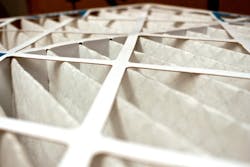Can You Filter COVID-19 From Indoor Air?
Builders may be wondering if there is an indoor air filtration system that could whisk the coronavirus out of a house, protecting the homeowner. Though a good filtration system could minimize the risk in theory, getting rid of a virus is more complicated than a quick filter switch. The effectiveness depends on the quality of the filter, air speed, home air diffusion, and other factors. But even if the system gets rid of a majority of the virus particles, contact with just one could infect a person. Still, improving indoor air quality still isn’t going to hurt anyone—it is just not the silver bullet.
You’re probably wondering if your HEPA or MERV air filters will protect you and your family from spreading Coronavirus around the house.
In short, the answer is “not always.” The problem is that no filter removes 100 percent of viral particles, 100 percent of the time. That doesn’t mean they don’t help. Good filters, especially when tied to your forced-air furnace or central air conditioning, greatly reduce the number of pathogens floating around your home. But anything less than 100 percent is still a risk. According to research conducted in 2009, a single virus particle is enough to infect someone—and lead to full-blown symptoms.
